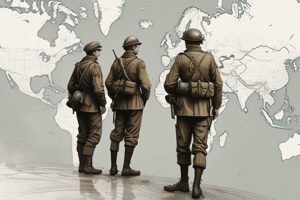Podcast
Questions and Answers
What international organization was created after World War II to promote peace and cooperation?
What international organization was created after World War II to promote peace and cooperation?
- World Trade Organization
- United Nations (correct)
- European Union
- International Monetary Fund
Which alliance formed after World War II is primarily focused on mutual defense among member countries?
Which alliance formed after World War II is primarily focused on mutual defense among member countries?
- World Health Organization
- European Union
- North Atlantic Treaty Organization (NATO) (correct)
- International Red Cross
What concept evolved over time into the European Union as it is known today?
What concept evolved over time into the European Union as it is known today?
- European Economic Area
- European Coal and Steel Community (correct)
- European Cooperation Community
- European Stability Mechanism
Which of the following is a key feature of the European Union?
Which of the following is a key feature of the European Union?
What significant improvements were made to Europe's infrastructure, industry, and social welfare systems after World War II?
What significant improvements were made to Europe's infrastructure, industry, and social welfare systems after World War II?
In what way has the European Union played a pivotal role on the global stage?
In what way has the European Union played a pivotal role on the global stage?
What were some of the factors that fueled the eruption of World War I?
What were some of the factors that fueled the eruption of World War I?
Which conflict is often regarded as the deadliest in human history?
Which conflict is often regarded as the deadliest in human history?
What event set off World War II in 1939?
What event set off World War II in 1939?
How many fatalities were estimated to have occurred during World War II?
How many fatalities were estimated to have occurred during World War II?
What were some outcomes of World War II?
What were some outcomes of World War II?
Which term was initially used to describe World War I?
Which term was initially used to describe World War I?
Flashcards are hidden until you start studying
Study Notes
Unraveling History: World Wars and Europe's Transformative Journey
Throughout much of the 20th century, world events were shaped by two devastating conflicts, the World Wars, which forever altered Europe's political landscape, social fabric, and global influence. This narrative delves into these pivotal episodes, illuminating their significance and the far-reaching impact they have had on our world.
World War I (1914-1918)
The Great War, as it was initially known, erupted in August 1914, fueled by a complex web of alliances, imperial ambitions, and nationalist sentiments. Fighting ensued across much of Europe, leading to widespread destruction, loss of life, and the dismantling of several empires. Over 9 million soldiers and 7 million civilians perished during the four years of conflict. In its aftermath, Europe faced profound challenges as it tried to cope with the social, economic, and political fallout of the war.
World War II (1939-1945)
Often regarded as the deadliest conflict in human history, World War II resulted in an estimated 50 to 85 million fatalities and the collapse of several European regimes. It was set off by Germany's invasion of Poland in 1939, but its roots lay in the failure to address issues left unresolved by World War I. The war saw the rise of fascism, the Holocaust, and the emergence of a bipolar world order dominated by the rival superpowers of the United States and the Soviet Union.
The Advent of Europe
Europe's transformation during the 20th century cannot be fully appreciated without explicating the concepts that accompanied it. The end of World War II brought about the creation of the United Nations, the North Atlantic Treaty Organization (NATO), and the European Union (EU). The EU, in particular, has played a crucial role in fostering peace, political integration, and economic cooperation across the continent.
In the decades following the Second World War, Europe experienced rapid economic growth and increasing interdependence, leading to the formation of a "European community" based on mutual interest and cooperation. This community evolved into the present-day EU, an economic and political union comprising 27 member states. The EU has become a global powerhouse, renowned for its welfare state, commitment to peace, and shared values.
Europe's post-war reconstruction efforts have been far-reaching, with the continent's infrastructure, industry, and social welfare systems seeing significant improvements. The EU has also played a pivotal role in the promotion of human rights, environmental protection, and the resolution of international conflicts.
Conclusion
The World Wars and Europe's subsequent evolution have become indelible chapters in human history, shaping modern societies and inspiring reflection on the nature of war, politics, and international relations. While the conflicts themselves were characterized by tremendous destruction and suffering, they ultimately paved the way for a more peaceful, interconnected, and prosperous world. This narrative, then, underscores the importance of understanding and learning from the past, for it is only by confronting its shadows that we might cultivate a brighter future.
Studying That Suits You
Use AI to generate personalized quizzes and flashcards to suit your learning preferences.




